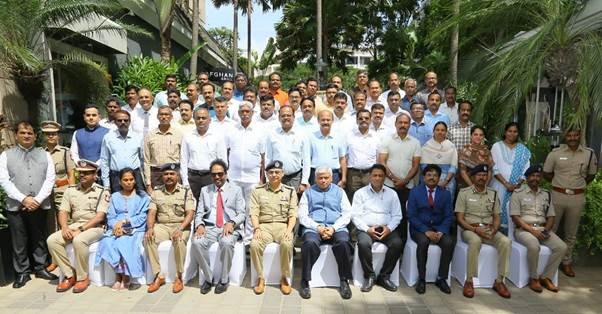NHRC organizes capacity-building programme for all India services officers on human rights
By Doruvu Paul Jagan Babu:Bureau Chief

Coimbatore – Tamilnadu: The National Human Rights Commission (NHRC) of India organized a two-day residential capacity-building programme from October 3-4, aimed at sensitizing All India Services Officers including IAS, IPS and IFS Officers from Tamil Nadu and Karnataka on human rights. The event, held in collaboration with Tamil Nadu Police, featured seven technical sessions covering various aspects of human rights and policing, with 45 officers, including Superintendents of Police (SP), Additional Superintendents (Addl. SP), and Deputy Inspectors General (DIG), in attendance.

Focus on preventive policing
The programme was inaugurated by NHRC Director General (I) Ajay Bhatnagar, in the presence of Tamil Nadu Director General of Police (DGP) Shankar Jiwal, Karnataka Additional Director General Devajyoti Roy, and NHRC Registrar (Law) Joginder Singh. Bhatnagar emphasized the need for preventive action in policing over punitive measures, urging officers to incorporate this philosophy in their work. DGP Shankar Jiwal praised the initiative, expressing appreciation for the innovative approach of conducting capacity-building at the zonal level in Coimbatore.

Ethical dilemmas and human rights
In the first session, Ajay Bhatnagar discussed the complexities and ethical dilemmas faced by police officers in balancing law enforcement with the protection of human rights. He highlighted the critical role officers play in ensuring justice while adhering to human rights frameworks.
Judicial activism and police role
Justice V Kannadasan, Member of the Tamil Nadu State Human Rights Commission, led the second session, speaking on the role of police in human rights protection. He addressed the issue of false complaints and emphasized the importance of judicial activism in delivering justice.
NHRC guidelines and Supreme Court precedents
During the third session, Joginder Singh, NHRC Registrar (Law), focused on guidelines issued by the NHRC for policing and discussed landmark Supreme Court cases, including those dealing with custodial violence and human rights violations during investigations. He stressed the need for transparency and accountability in law enforcement.

Redressing human rights complaints in Karnataka
Devajyoti Roy, Additional Director General of Police, Karnataka, led the fourth session, offering insights into the Karnataka State Human Rights Commission’s (KSHRC) innovative complaint registration systems, which include both app-based and web-based platforms to ease the process of reporting human rights violations.
Evolution of human rights framework
On Day 2, NHRC Secretary General Bharat Lal delivered a session on the evolution of the human rights framework, drawing from historical examples such as Mahatma Gandhi, Dr. Ambedkar, and civil rights leaders like Nelson Mandela and Martin Luther King Jr. He appealed to police officers to act as true defenders of human rights, particularly for the vulnerable.
Human rights jurisprudence and landmark cases
Rajiv Jain, former NHRC Member, led the second session on human rights jurisprudence, highlighting Article 21 of the Indian Constitution and referencing key Supreme Court cases such as Sunil Batra and Maneka Gandhi. He discussed prisoners’ rights, state liability, and the judiciary’s role in safeguarding fundamental human rights.

Human rights violations in Tamil Nadu
The final session, led by Joginder Singh, addressed cases of human rights violations registered with the NHRC related to Tamil Nadu. He discussed trends in violations and the Commission’s ongoing efforts to address them.
The two-day programme aimed to equip officers with a deeper understanding of their role in upholding human rights while executing their duties.









